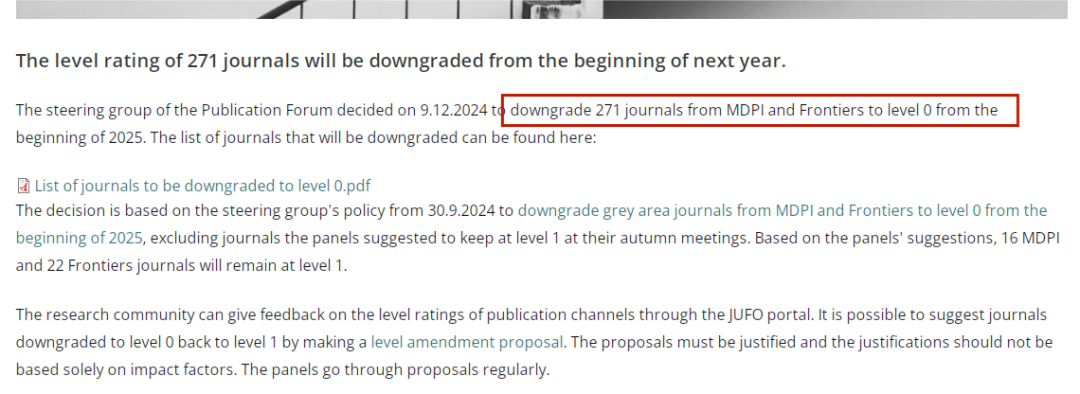
Recently, the Finnish Publishing Forum (JUFO) announced that from 2025, 271 journals from MDPI and Frontiers will be downgraded to level 0- in simple terms, these journals are considered to not meet basic academic standards.
As soon as the relevant report was released, the academic circle exploded with people asking, "With so many graduation journals, can we still submit? What should we do now. Let's take a look together at something.

271 journals have been downgraded
The original translation is as follows:
On December 9, 2024, the Guidance Committee of the Publishing Forum decided to downgrade 271 journals under MDPI (Multidisciplinary Digital Publishing Institute) and Frontiers to level 0 starting from early 2025.
According to the guidance group policy of September 30, 2024, starting from early 2025, journals in the grey area of MDPI and Frontiers publishing houses will be downgraded to level 0, except for journals recommended by various expert groups to remain at level 1 at the autumn meeting.
The research community can provide feedback on the level assessment of publishing channels through the JUFO portal website. It is possible to suggest upgrading journals that have been downgraded to level 0 to level 1 by submitting a level modification proposal. Proposals must be accompanied by reasonable justifications, and these justifications should not be solely based on impact factors. The expert group will regularly review these suggestions
What organization is JUFO?

JUFO, The full name Julkaisuforumi (Publishing Forum) is jointly developed and maintained by The Federation of Finnish Learned Societies, the Academy of Finland, and Finnish higher education institutions. JUFO sets quality levels for academic journals, conference proceedings, and books to guide research funding and evaluation in Finland.
JUFO categorizes academic journals, books, and other publications into three levels based on their international recognition, influence, and quality:
Level 0 (no significant academic quality)
Level 1 (Basic Level)
Level 2 (High Level)
Level 3 (Top Level)
The more you look at it, the more familiar it becomes. In other words, this is equivalent to the Finnish version of the "Chinese Academy of Sciences zoning", which will only affect the allocation of academic resources in Finland.
So JUFO's decision did not actually have a significant impact on the submissions of Chinese scholars and researchers, and did not affect everyone's submissions.

Three major OA publishers have been blacklisted one after another?

Previously, in February 2023, Anhui Provincial Hospital issued a notice that the series of journals published by Hindawi, MDPI, and Frontiers, the three major OA journal publishers, would be included in the "Reminder Journals", "Not Recommended for Submission, Not Reimbursable for Page Fees, and Not Included in Scientific Research Performance Statistics".
In July of the same year, the First Affiliated Hospital of Zhejiang University updated the "List of Journals Not Recommended for Submission", which included all journals under Hindawi and Frontiers publishing houses.
By 2024, only one journal from Frontiers in Energy Research will be alerted on the alert list of the Chinese Academy of Sciences, and only one journal from the Hindawi series will be on the list (Journal of Sensors, due to the high proportion of Chinese authors and paper factories). MDPI has the most alerts (we have previously updated the alert list of the Chinese Academy of Sciences, click to view specific information), with most of them being medical journals.
In 2023, MDPI, Hindawi, and Frontiers, the three major open access (OA) publishers, experienced almost a year of controversy, from being blacklisted by multiple institutions, to journals being removed from SCI catalogs, to being accused of being "predatory journals". By 2024, these publishers still cannot shake off the controversy.
For ordinary scientific researchers, it is necessary to evaluate the target journal more carefully before submitting. It is suggested to comprehensively consider the self citation rate, the proportion of countrymen people, the number of papers issued, the early warning situation and other aspects, and understand the specific requirements and policies of the school or unit in advance to ensure that the submission decisions not only comply with the regulations, but also maintain academic integrity, while improving the quality and influence of their own research results.